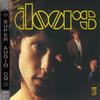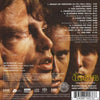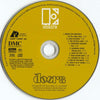





The Doors (Hybrid SACD)
[click here to see more vinyl featuring The Doors]
Jim Morrison (vocals), Ray Manzarek (keyboards), John Densmore (drums), Robby Krieger (guitar)
Written by The Doors
1 SACD, jewel box
Original analog Master tape : YES
Stereo
Studio
Label : Analogue Production
Original Label : Elektra
Mastered by Doug Sax, overseen by Bruce Botnick, The Doors producer/engineer.
Debut studio album originally released January 4, 1967
Reissued in 2013
Tracks
Side A :
- Break On Through (To The Other Side)
- Soul Kitchen
- The Crystal Ship
Side B :
- Twentieth Century Fox
- Alabama Song (Whisky Bar)
Side C :
- Light My Fire
- Back Door Man
- I Looked At You
- End Of The Night
- Take It As It Comes
Side D :
- The End
Awards:
Rolling Stone 500 Greatest Albums of All Time - Rated 86/500!
Rolling Stone 500 Greatest Songs of All Time - "The End" - Rated 336/500!
Reviews :
« In this edition of the Bob Smeaton-directed audiovisual Classic Albums series, viewers are taken beyond the grooves of the Doors' 1967 self-titled debut long-player. Joining us for the journey are the recollections of many of those who were intimately involved in the creation of the quartet's eponymous platter, namely the three surviving Doors Ray Manzarek (keyboards/vocals), Robbie Krieger (guitar), and John Densmore (percussion). Plus, their manager Bill Siddons, original engineer/producer Bruce Botnick, and Elektra Records' founder Jac Holzman. Also on hand is beat era poet Michael McClure -- who was an admitted influence on Jim Morrison (vocals) and one of the earliest proponents of Morrison's lyrics as pure poetry. Subsequent generations of Los Angeles-based rockers -- most notably Perry Farrell and Henry Rollins -- as well as famed L.A. disc jockey Jim Ladd (aka "The Last DJ") offer up a view of choice insights on the Lizard King. Farrell makes an astute comparison of Morrison's musical guise as a crooner to the likes of Frank Sinatra's world-weary, rode-hard-and-put-up-wet persona. That leads into Botnick's retelling of Morrison's first encounter with a Neumann U4 vocal microphone. A fair amount of screen time is dedicated to Botnick's manipulation of the multitrack tapes as he emphasizes particular instruments such as Densmore's unforgettable samba lick commencing "Break on Through," Morrison's a cappella introduction to "The Crystal Ship," or Manzarek's performance on the Marxophone during "Alabama Song." Additional fascinating insights uncover Krieger's open-tuning, which was incorporated into the ethereal "End of the Night." He also talks about his considerable background playing flamenco-style guitar, which he had taught on a University level. He then launches into the beguiling and haunting introduction to "Spanish Caravan." Other extras of note center around the retelling of how one of Morrison's hallucination-informed incidents nearly sidelined the making of the first LP. Plus, Manzarek's transcendent recollections as "Ray Tells the Story of the Night They Played 'The End' at the Whisky-A-Go-Go." Remarkably revealing is the concluding "John Tells His Tricks of the Trade," which -- despite being a fascinating aside -- might be of specific interest to percussionists rather than casual fans. Which brings up the double-edge that simultaneously blesses and plagues many of the entries in the Classic Albums canon: that being the sheer exclusion of key deep album tracks, presumably by time restrictions. There is nary a mention of "I Looked at You" -- which would have been great for dissection by McClure as opposed to the lengthy supplementary "Michael McClure Reads 'Break on Through (To the Other Side)." Similar dismissals are given to "Take It as It Comes" and "20th Century Fox." That said, one would certainly rather have it "as is" than not at all. » AllMusic Review by Lindsay Planer
Ratings :
AllMusic : 3.5 / 5 , Discogs : 4.62 / 5


